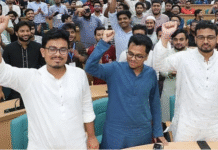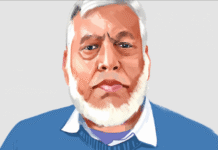
What does it even mean to have privilege?
One of the things I quite vehemently opposed as a young(er) adult was the concept of privilege.
My young mind, full of vitriol for the safe space-loving, politically correct speech-promoting, left-wing propaganda-spreading category of people, refused to either stand or understand the idea behind the so-called advantages that people were born into as a result of their wealth or status.
I found the way certain groups of people were coddled continuously by mainstream media and my peers eyeroll-worthy, evoking in me sentiments ranging from dismissive passive aggressiveness to frustrated rage.
It seemed to me that such rhetoric was detrimental not only to the ideas of free expression, but also prevented certain groups of people from taking responsibility for their actions (which had nothing short of a clear-cut cause-and-effect relationship).
Freedom was the bedrock on which my philosophy stood: Freedom to say what we want, do what we want.
If I wished to charge Tk50,000 for medicine, that was my prerogative. The people who needed it had every right to not buy my product. If I wished to insult a particular religion or class or culture of people, that was my prerogative, too.
Was it up to me to ensure that every single individual wasn’t offended by my words? Well, if that was the case, I told myself, then we wouldn’t be able to say anything.
Anything we said would eventually end up offending someone or the other, and we would not be able to have any conversation that would attempt to actually get to the truth of the matter.
This attitude, to a great extent exacerbated by the condescension of the left wing and the provocative (and what seemed to me applaudable in the contemporary environment) nature of certain contrarians such as Christina Hoff Sommers and Bill Maher (the Maher association brings me great shame) and shows such as South Park and magazines such as Charlie Hebdo, was ignorant of the privilege that I already had.
I was in London at the time and struggling to pay rent. As a brown immigrant from a non-EU, Muslim-majority country (ensuring my place as a second-class denizen of the city), I understood that this was the hand I was dealt.
It merely meant that I would have to work a few times as hard as a white citizen of the UK; it did not mean that I would go around boo-hooing about my lack of privilege to the world and demanding that the world owes me something.
It was clear to me that the world owed me nothing, and least of all a foreign nation.
Did it breed resentment? Of course.
I saw uneducated Bangladeshis who had enrolled in so-called “visa universities,” unable to string together an understandable sentence of English or understand British culture (I merely bring this up because this is a strong point of contention for anti-immigration lobbyists), finding ways to cheat the system and working for cash, staying there for years, inching closer to citizenship.
I, on the other hand, a model immigrant, with a proper degree, unable to even earn an interview, was being rejected by a society for which I was made (or so I felt).
But this was the reality. What was there for me to complain about? I repeat: This was the hand I was dealt. And I wasn’t playing the game as effectively as my fellow immigrants were.
But, the thing is, the very fact that I was studying in a European country, with fees which had been covered by my dad (for the first couple of years), was indeed a privilege that I refused to acknowledge.
There were millions of people worse off than me, and while I struggled to pay rent in the land of the great British Empire, I have never faced such struggles in my own country.
The privilege was having someone standing behind me at all times, ready (maybe with a scolding) to transfer certain amounts if I ever really, really needed it.
It was easy in that position to feel like people just had to make the best of the hands they were dealt. But then, when I lost this privilege in Bangladesh, when the support this person had provided me all my life disappeared, I found myself utterly alone, and needing help.
Suddenly, it felt unfathomable to me that there were people around me who had the privilege to never worry about the money they were spending.
Sure, they were going broke at the end of each month, but it was from buying fancy things and going on trips; not because they actually needed to go broke.
I saw how vulnerable I was: A single tragedy, such as a health issue, could render me completely vulnerable to the relentless vicissitudes that any unending such struggle would ensure.
I was vulnerable not only to the emotional turmoil of a health crisis, but also to lakhs of taka worth of debt that I would inevitably be burdened with.
I wasn’t being dramatic when I started to see homelessness as a very real possibility. What if I, or someone dependent on me, had cancer, requiring treatment here, and then abroad? After selling everything I have currently (and I’ve counted), it still would not be close to enough to ensure a sustained treatment plan.
In fact, the rational thing to do here would be to accept my fate, and welcome death in all its painful glory.
As Bernie Sanders becomes more and more popular in the US, I cannot help but wonder how many of his supporters have gone through the same journey I have.
I look at the utter hope that Bernie provides and feel tremendous envy: Would we ever have even the possibility of a nation that takes care of my family and I, no matter how bad things get? (And I was feeling this as a person alreadymore privileged in many ways than the rest of my country’s citizens.)
And I cannot help but feel envy for the privileged classes: How comforting it must be, no, to have enough wealth to never worry about schooling for your children or the health of your ageing parent and live so that you can work hard, not towards merely ensuring that you and your family survive, but to pursue your dreams, to do something that you want to, as opposed to something that you absolutely must?
SN Rasul is an Editorial Assistant at the Dhaka Tribune and a Lecturer of English at North South University. He can be followed everywhere @snrasul.









